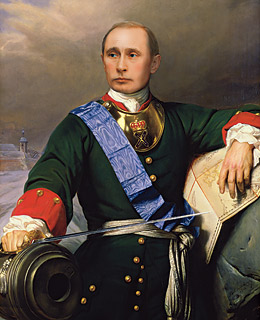
I have friends who predict that Vladimir Putin will find his new position as Russian prime minister a comedown after eight years as President. I doubt it. Putin is more likely to define his job than be defined by it. After our first meetings, in 1999 and 2000, I described him in my journal as "shrewd, confident, hard-working, patriotic, and ingratiating." In the years since, he has become more confident and — to Westerners — decidedly less ingratiating.
Some believe Putin's KGB background explains everything, but his allegiance to the KGB is in turn explained by his intense nationalism — which accounts for his popularity in Russia. Timing matters in history, and Putin has had the benefit of high oil prices and the contrast with his predecessor, Boris Yeltsin. His vision of Russia is that of a great power in the old-fashioned European sense. Such powers have spheres of influence and subjugate lesser powers. At home, they celebrate national traditions and prize collective glory, not individual freedom.
Tolstoy described the 19th century count Mikhail Speransky as a "rigorous-minded man of immense intelligence, who through his energy...had come to power and used it solely for the good of Russia." What one found disconcerting, though, "was Speransky's cold, mirror-like gaze, which let no one penetrate to his soul [and] a too great contempt for people." It is possible to love the idea of a nation without caring too much for its citizens.
It is unlikely that Putin, 55, will wear out his welcome at home anytime soon, as he has nearly done with many democracies abroad. In the meantime, he will remain an irritant to nato, a source of division within Europe and yet another reason for the West to reduce its reliance on fossil fuels.
Albright is a former U.S. Secretary of State